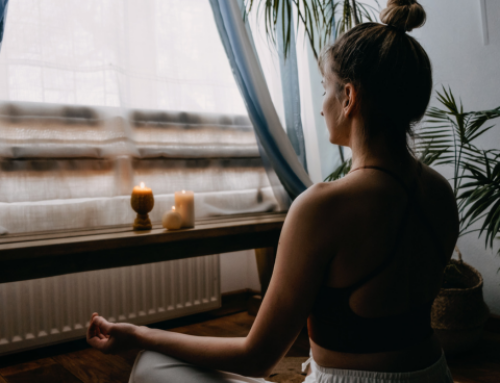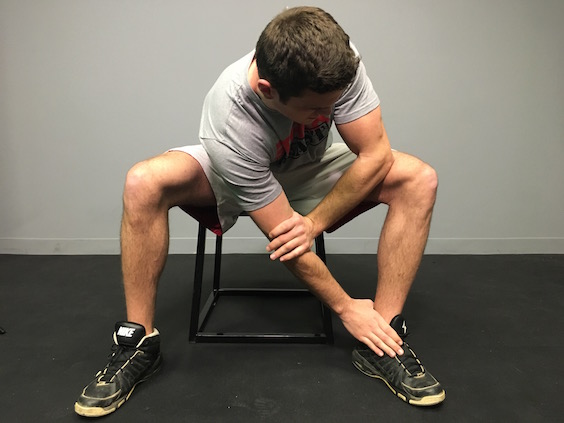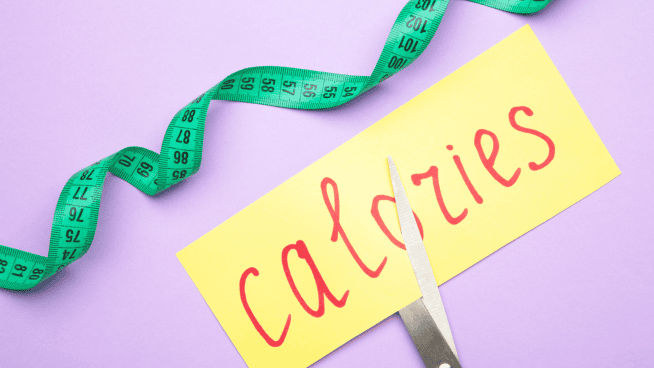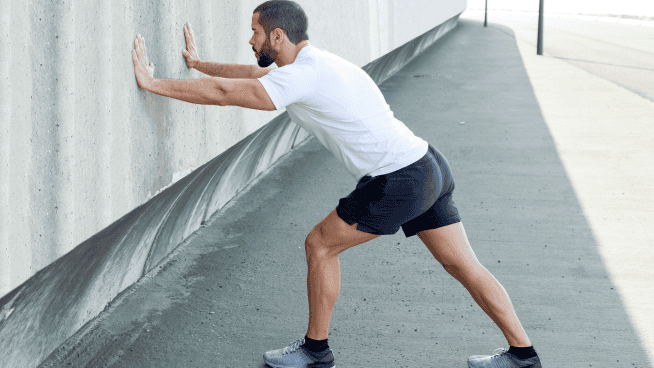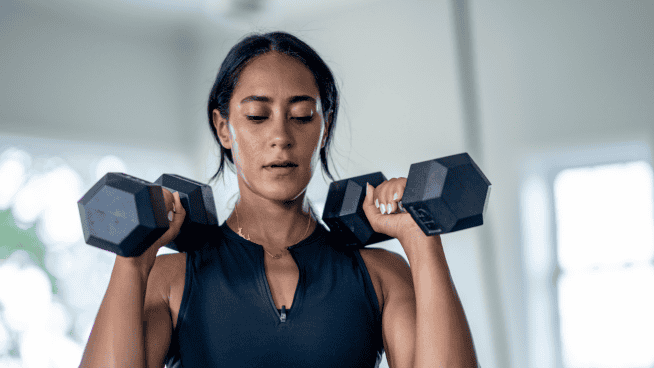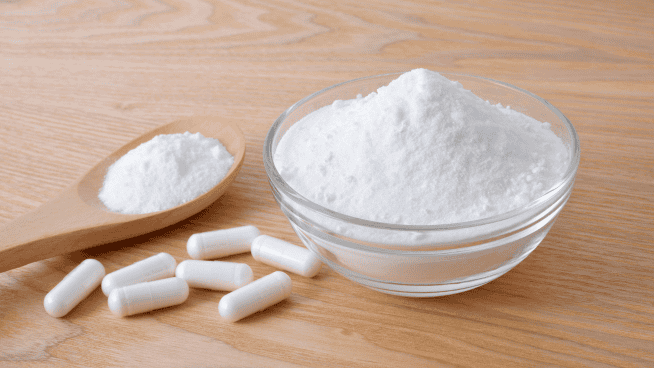Could This Non-Prescription Sleep Aid Be Your Key To Improved Focus And Performance?
Not getting enough sleep can have disastrous consequences.
The scary part is that most Americans are feeling those consequences at this very moment. According to renowned sleep expert Dr. James Maas, who coined the term “power nap,” the average American is now getting just 6.1 hours of sleep per night. That’s roughly one to two hours short of what they need. For younger people (anyone from puberty to age 24), the requirement is even greater—they need about 9.25 hours a night to be at their peak.
But getting enough sleep is often easier said than done. Busy lives, worried minds and undiagnosed sleep disorders prevent millions of Americans from getting enough quality shuteye. Prescription sleep aids have become more prominent. Scientific American recently estimated that more than 8.5 million Americans use prescription sleep aids. But those can have serious, potentially life-altering side effects.
Dr. Maas told STACK, “For years and years, people have been relying on prescription sleep medications. And the evidence is quite clear—nearly all, if not all, prescription medications for sleep put you at risk for things like depression and daytime sleep inertia, which means a lack of mental clarity or fogginess all day long. So the side effects are very dangerous with most sleeping compounds. Either they drug you too much and don’t give you a normal night’s sleep or they interfere with daytime alertness.”
What if there were a sleep supplement that guaranteed a better night’s sleep without any of those nasty side effects? And what if it were NSF Certified for Sport, making it totally legal in almost every competitive athletic league on Earth? What if it was all of those things and you didn’t even need a prescription to buy it. That’s the idea behind Power Off, a dietary sleep supplement developed by Vitalere as part of their “Modus Nutrition” line. Dr. Maas advised Vitalere during the product’s production, and he recommends the product to his clients. Here’s why Power Off could change the way we think about sleep supplements.
Living a Sleep-Deprived Life
Before we dive into the supplement itself, let’s talk about the effects of not getting enough sleep. As the amount of research on sleep and its effects continues to grow, we’re finding that sleep has an impact on almost every part of your life.
“Not meeting your sleep requirement has serious deleterious consequences. It significantly increases your risk of heart disease, stroke, diabetes, obesity, cancer—you name it,” Dr. Maas says. “Sleep deprivation lowers your immunity and puts your health at risk. Emotionally, sleep deprivation increases your risk of clinical depression and makes you more irritable and anxious. Your motor coordination and reaction time suffer. Cognitively, there’s a huge detriment. Concentration, critical thinking, creative thinking—it all suffers when you don’t meet your sleep requirement. Sleep quality and quantity is also the best prediction of how long we’re going to live. In short, sleep deprivation makes you clumsy, ignorant and shortens your life.”
For athletes, not getting enough sleep is particularly harmful. A 2011 study in the journal SLEEP found that Stanford basketball players were able to dramatically improve their on-court performance simply by increasing their total amount of sleep time. After increasing their sleep to 10 hours per night for five to seven weeks, players saw big improvements in sprint performance and shooting accuracy. Reported fatigue also decreased. “If you told an athlete you had a treatment that would reduce the chemicals associated with stress, that would naturally increase human growth hormone, that enhances recovery rates, that improves performance, they would all do it,” Dallas Mavericks trainer Casey Smith told ESPN.
RELATED: Think Sleep Doesn’t Matter? Many Seahawks Players Go To Bed Before 10 p.m.
Elite athletes are now taking sleep much more seriously than they used to. Many players on the Seattle Seahawks report going to bed before 10 p.m., and Tom Brady once said he regularly goes to bed at 8:30 p.m.
“[Coaches and athletes] are now looking for that silver bullet, that extra advantage beyond physical conditioning that will turn into success and victory. They’re turning to sleep doctors like myself to find out what the role of sleep is in athletic performance,” says Dr. Maas, who has advised teams like the Miami Dolphins, Nashville Predators, New York Jets and the Canadian men’s Olympic hockey team on sleep.
A Different Kind of Sleeping Pill
There are many reasons someone might need the help of a sleeping pill to get a good night’s rest. Even if you don’t technically think you have insomnia or sleep apnea, a whole host of other disorders could be causing you sleep troubles. “There are 89 differentially diagnosable sleep disorders, not just the four or five most people commonly think of,” Dr. Maas says. Even if you don’t technically have a sleep disorder, you might not be great at sleeping for one reason or another. That’s OK. The average American’s inability to get enough quality sleep is exactly why Power Off was developed.
“Power Off was designed to address a need in the general population and in sports that is rampant—chronic poor sleep quality. Power Off was designed to help individuals having difficulty falling asleep and staying asleep improve their quality of sleep,” Dr. Robert Pastore, Vitalere’s chief science officer, told STACK. “We understood the prevalent overuse of prescription sleeping pills by the general population and by athletes and wanted to give them a safe and effective alternative.”
According to the company’s website, “Power Off aids sleep through all key stages, ensuring an optimal amount of deep sleep while preventing morning grogginess that often occurs with other supplements and sleep aids.”
Sounds great, but what’s actually in this stuff? The current formulation features nine different ingredients. Let’s run them down one by one.
California poppy is a common plant in North and South America. Though studies have been limited, it has been found to have a sedatory effect in rats and humans. “It offers a mild sedative influence on the central nervous system. It may also inhibit adrenaline synthesis, thus being effective in insomnia caused by over-excitability or restlessness,” Pastore says.
L-cystine is a form of the amino acid L-Cysteine. It’s common in foods such as eggs, meat, dairy products and whole grains. It helps regulate excitatory neurotransmitters, putting your restless mind in a better state. “We believe this ingredient reduces an excitatory response, promoting a more relaxed state,” Pastore says.
L-Theanine is an amino acid found in green tea leaves. According to Examine.com, it’s known to promote relaxation and reduce stress. Clinical studies have found that it helps people stay asleep more soundly throughout the night.
GABA is the major “downer” neurotransmitter. It counters glutamate (the “upper” neurotransmitter) and the two mediate the daily rises and falls in brain activity. The “centerpiece” of Power Off is a novel, highly absorbable GABA molecule that is capable of passing the blood-brain barrier to promote sleep and relaxation. This molecule is one of the major differentiating factors between Power Off and other sleep supplements on the market. “They’ve studied the blood-brain barrier to see what can cross the barrier and effect the sleep system without affecting the waking system. That’s pure gold,” Dr. Maas says.
RELATED: The Scientific Reasons You Feel More Tired During Winter
5-HTP is an amino acid that can be used to increase brain serotonin levels. There’s at least one trial saying it reduces sleep terrors, and Pastore says it’s included for its ability to reduce intermittent awakenings during the night.
Magnolia Officinalis Bark Extract promotes a calming response in the body. It may reduce the amount of free radicals in the brain. It also contains a compound called honokiol that’s been found to shorten sleep latency and stimulate sleep-promoting neurons in the brain.
Glycine is another amino acid that has a calming influence on the central nervous system. In part by reducing core body temperature, Glycine has been found to improve sleep quality.
The active form of vitamin B6 helps support sleep/wake cycles and the formation of important neurotransmitters.
Melatonin has long been recognized as capable of enhancing sleep. “Power Off contains a very small amount of melatonin (50 micrograms per capsule) to make sure the formula is complete at addressing every possible pathway toward enhancing sleep quality,” Pastore says. So, that’s 100 micrograms per 2 capsule serving. For reference, most people who take melatonin by itself for sleep use a dosage between 1 and 5 milligrams. There are 1,000 micrograms in a milligram, so that is indeed a relatively small amount.
“There is not one ingredient alone that is responsible for the benefits of Power Off,” Pastore says. “It’s based on the principle of synergy, where the sum of the key ingredients works better than the parts.”
That might sound like buzzword marketing, but there’s research to back it up. For example, a 2016 study found that a mixture of GABA and 5-HTP resulted in improved sleep quality and sleep duration greater than a single administration of either amino acid.
There’s also the fact that a single supplement might simply not work for some people. “There’s been a proliferation of herbal remedies that people have tried. For some people something will work, and for others it doesn’t. I think a lot of it is placebo medicine,” Dr. Maas says. Since Power Off offers nine different ingredients that have all been proven to improve sleep quality in some form or another, even if a person doesn’t naturally respond to, say, melatonin, there are eight other ingredients that can help get the job done.
Safe, Certified, Effective
Perhaps the most important thing about Power Off for athletes is the fact that it’s NSF Certified for Sport. This means that athletes of any level can take the supplement without worrying they’re ingesting a banned or tainted supplement. The NSF Certified for Sport label is recognized by the NCAA, NFL, MLB, PGA, NHL and many other top leagues. “We believe in safety and efficacy first. Power Off can safely be taken by any and all professional athletes, including Olympic athletes. Power Off can be taken daily without the risk of dependency. Not many sleep-based dietary supplements can make that claim,” Pastore says. “This is a continual process of testing, inspection and validation.”
That’s why Dr. Maas has no qualms about recommending Power Off. Not only has he taken it himself, but he’s given it to clients like athletes, pilots and those with severe sleep disorders. The results have been overwhelmingly positive. “Having tested it out on myself and on others, I am a firm believer in the efficacy of their compound,” Dr. Maas says.
I was provided with a three-day sample of Power Off and used it myself. While I’ve never been one to struggle with falling asleep, I can say that the supplement did seem to help me sleep more soundly throughout the night (i.e., no tossing and turning, no awkwardly waking up at 5 when I don’t have to be up until 8, etc.). Since I’m not an elite athlete, I can’t really say whether the supplement seemed to affect my performance during training.
RELATED: 18 Rules For Better Sleep
Though he believes in the supplement, Maas stresses that it’s not a magic bullet for sleep. For example, you shouldn’t start playing video games right after you ingest Power Off and expect to magically pass out on the couch for a restful night’s sleep. Good sleep hygiene is incredibly important. Some rules for good sleep hygiene from Dr. Maas:
- Establish a regular bed time and stick to it
- Establish a regular wake-up time and stick to it
- Have a quiet, dark, cool bedroom
- Keep pets off the bed
- No caffeine after 2 in the afternoon
- No liquor within 3 hours of bedtime
- Get plenty of physical and mental exercise throughout the day
- Don’t use electronics with an hour of bedtime
“It’s general good common sense, but a lot of us don’t use our common sense when it comes to sleep,” Dr. Maas says. If you’re interested in giving Power Off a shot, the supplement is available on the Modus Nutrition website. Pastore says that the supplement is best taken immediately before bed, right before your head hits the pillow. “Not hours before, or even 30 minutes before bed,” Pastore says. “Taking Power Off and then watching TV or stimulating your eyes and brain with artificial light from electronic devices is not optimal. The recommendation is to power down your devices for the evening, wash up, brush your teeth, and then take Power Off.”
READ MORE:
RECOMMENDED FOR YOU
MOST POPULAR
Could This Non-Prescription Sleep Aid Be Your Key To Improved Focus And Performance?
Not getting enough sleep can have disastrous consequences.
The scary part is that most Americans are feeling those consequences at this very moment. According to renowned sleep expert Dr. James Maas, who coined the term “power nap,” the average American is now getting just 6.1 hours of sleep per night. That’s roughly one to two hours short of what they need. For younger people (anyone from puberty to age 24), the requirement is even greater—they need about 9.25 hours a night to be at their peak.
But getting enough sleep is often easier said than done. Busy lives, worried minds and undiagnosed sleep disorders prevent millions of Americans from getting enough quality shuteye. Prescription sleep aids have become more prominent. Scientific American recently estimated that more than 8.5 million Americans use prescription sleep aids. But those can have serious, potentially life-altering side effects.
Dr. Maas told STACK, “For years and years, people have been relying on prescription sleep medications. And the evidence is quite clear—nearly all, if not all, prescription medications for sleep put you at risk for things like depression and daytime sleep inertia, which means a lack of mental clarity or fogginess all day long. So the side effects are very dangerous with most sleeping compounds. Either they drug you too much and don’t give you a normal night’s sleep or they interfere with daytime alertness.”
What if there were a sleep supplement that guaranteed a better night’s sleep without any of those nasty side effects? And what if it were NSF Certified for Sport, making it totally legal in almost every competitive athletic league on Earth? What if it was all of those things and you didn’t even need a prescription to buy it. That’s the idea behind Power Off, a dietary sleep supplement developed by Vitalere as part of their “Modus Nutrition” line. Dr. Maas advised Vitalere during the product’s production, and he recommends the product to his clients. Here’s why Power Off could change the way we think about sleep supplements.
Living a Sleep-Deprived Life
Before we dive into the supplement itself, let’s talk about the effects of not getting enough sleep. As the amount of research on sleep and its effects continues to grow, we’re finding that sleep has an impact on almost every part of your life.
“Not meeting your sleep requirement has serious deleterious consequences. It significantly increases your risk of heart disease, stroke, diabetes, obesity, cancer—you name it,” Dr. Maas says. “Sleep deprivation lowers your immunity and puts your health at risk. Emotionally, sleep deprivation increases your risk of clinical depression and makes you more irritable and anxious. Your motor coordination and reaction time suffer. Cognitively, there’s a huge detriment. Concentration, critical thinking, creative thinking—it all suffers when you don’t meet your sleep requirement. Sleep quality and quantity is also the best prediction of how long we’re going to live. In short, sleep deprivation makes you clumsy, ignorant and shortens your life.”
For athletes, not getting enough sleep is particularly harmful. A 2011 study in the journal SLEEP found that Stanford basketball players were able to dramatically improve their on-court performance simply by increasing their total amount of sleep time. After increasing their sleep to 10 hours per night for five to seven weeks, players saw big improvements in sprint performance and shooting accuracy. Reported fatigue also decreased. “If you told an athlete you had a treatment that would reduce the chemicals associated with stress, that would naturally increase human growth hormone, that enhances recovery rates, that improves performance, they would all do it,” Dallas Mavericks trainer Casey Smith told ESPN.
RELATED: Think Sleep Doesn’t Matter? Many Seahawks Players Go To Bed Before 10 p.m.
Elite athletes are now taking sleep much more seriously than they used to. Many players on the Seattle Seahawks report going to bed before 10 p.m., and Tom Brady once said he regularly goes to bed at 8:30 p.m.
“[Coaches and athletes] are now looking for that silver bullet, that extra advantage beyond physical conditioning that will turn into success and victory. They’re turning to sleep doctors like myself to find out what the role of sleep is in athletic performance,” says Dr. Maas, who has advised teams like the Miami Dolphins, Nashville Predators, New York Jets and the Canadian men’s Olympic hockey team on sleep.
A Different Kind of Sleeping Pill
There are many reasons someone might need the help of a sleeping pill to get a good night’s rest. Even if you don’t technically think you have insomnia or sleep apnea, a whole host of other disorders could be causing you sleep troubles. “There are 89 differentially diagnosable sleep disorders, not just the four or five most people commonly think of,” Dr. Maas says. Even if you don’t technically have a sleep disorder, you might not be great at sleeping for one reason or another. That’s OK. The average American’s inability to get enough quality sleep is exactly why Power Off was developed.
“Power Off was designed to address a need in the general population and in sports that is rampant—chronic poor sleep quality. Power Off was designed to help individuals having difficulty falling asleep and staying asleep improve their quality of sleep,” Dr. Robert Pastore, Vitalere’s chief science officer, told STACK. “We understood the prevalent overuse of prescription sleeping pills by the general population and by athletes and wanted to give them a safe and effective alternative.”
According to the company’s website, “Power Off aids sleep through all key stages, ensuring an optimal amount of deep sleep while preventing morning grogginess that often occurs with other supplements and sleep aids.”
Sounds great, but what’s actually in this stuff? The current formulation features nine different ingredients. Let’s run them down one by one.
California poppy is a common plant in North and South America. Though studies have been limited, it has been found to have a sedatory effect in rats and humans. “It offers a mild sedative influence on the central nervous system. It may also inhibit adrenaline synthesis, thus being effective in insomnia caused by over-excitability or restlessness,” Pastore says.
L-cystine is a form of the amino acid L-Cysteine. It’s common in foods such as eggs, meat, dairy products and whole grains. It helps regulate excitatory neurotransmitters, putting your restless mind in a better state. “We believe this ingredient reduces an excitatory response, promoting a more relaxed state,” Pastore says.
L-Theanine is an amino acid found in green tea leaves. According to Examine.com, it’s known to promote relaxation and reduce stress. Clinical studies have found that it helps people stay asleep more soundly throughout the night.
GABA is the major “downer” neurotransmitter. It counters glutamate (the “upper” neurotransmitter) and the two mediate the daily rises and falls in brain activity. The “centerpiece” of Power Off is a novel, highly absorbable GABA molecule that is capable of passing the blood-brain barrier to promote sleep and relaxation. This molecule is one of the major differentiating factors between Power Off and other sleep supplements on the market. “They’ve studied the blood-brain barrier to see what can cross the barrier and effect the sleep system without affecting the waking system. That’s pure gold,” Dr. Maas says.
RELATED: The Scientific Reasons You Feel More Tired During Winter
5-HTP is an amino acid that can be used to increase brain serotonin levels. There’s at least one trial saying it reduces sleep terrors, and Pastore says it’s included for its ability to reduce intermittent awakenings during the night.
Magnolia Officinalis Bark Extract promotes a calming response in the body. It may reduce the amount of free radicals in the brain. It also contains a compound called honokiol that’s been found to shorten sleep latency and stimulate sleep-promoting neurons in the brain.
Glycine is another amino acid that has a calming influence on the central nervous system. In part by reducing core body temperature, Glycine has been found to improve sleep quality.
The active form of vitamin B6 helps support sleep/wake cycles and the formation of important neurotransmitters.
Melatonin has long been recognized as capable of enhancing sleep. “Power Off contains a very small amount of melatonin (50 micrograms per capsule) to make sure the formula is complete at addressing every possible pathway toward enhancing sleep quality,” Pastore says. So, that’s 100 micrograms per 2 capsule serving. For reference, most people who take melatonin by itself for sleep use a dosage between 1 and 5 milligrams. There are 1,000 micrograms in a milligram, so that is indeed a relatively small amount.
“There is not one ingredient alone that is responsible for the benefits of Power Off,” Pastore says. “It’s based on the principle of synergy, where the sum of the key ingredients works better than the parts.”
That might sound like buzzword marketing, but there’s research to back it up. For example, a 2016 study found that a mixture of GABA and 5-HTP resulted in improved sleep quality and sleep duration greater than a single administration of either amino acid.
There’s also the fact that a single supplement might simply not work for some people. “There’s been a proliferation of herbal remedies that people have tried. For some people something will work, and for others it doesn’t. I think a lot of it is placebo medicine,” Dr. Maas says. Since Power Off offers nine different ingredients that have all been proven to improve sleep quality in some form or another, even if a person doesn’t naturally respond to, say, melatonin, there are eight other ingredients that can help get the job done.
Safe, Certified, Effective
Perhaps the most important thing about Power Off for athletes is the fact that it’s NSF Certified for Sport. This means that athletes of any level can take the supplement without worrying they’re ingesting a banned or tainted supplement. The NSF Certified for Sport label is recognized by the NCAA, NFL, MLB, PGA, NHL and many other top leagues. “We believe in safety and efficacy first. Power Off can safely be taken by any and all professional athletes, including Olympic athletes. Power Off can be taken daily without the risk of dependency. Not many sleep-based dietary supplements can make that claim,” Pastore says. “This is a continual process of testing, inspection and validation.”
That’s why Dr. Maas has no qualms about recommending Power Off. Not only has he taken it himself, but he’s given it to clients like athletes, pilots and those with severe sleep disorders. The results have been overwhelmingly positive. “Having tested it out on myself and on others, I am a firm believer in the efficacy of their compound,” Dr. Maas says.
I was provided with a three-day sample of Power Off and used it myself. While I’ve never been one to struggle with falling asleep, I can say that the supplement did seem to help me sleep more soundly throughout the night (i.e., no tossing and turning, no awkwardly waking up at 5 when I don’t have to be up until 8, etc.). Since I’m not an elite athlete, I can’t really say whether the supplement seemed to affect my performance during training.
RELATED: 18 Rules For Better Sleep
Though he believes in the supplement, Maas stresses that it’s not a magic bullet for sleep. For example, you shouldn’t start playing video games right after you ingest Power Off and expect to magically pass out on the couch for a restful night’s sleep. Good sleep hygiene is incredibly important. Some rules for good sleep hygiene from Dr. Maas:
- Establish a regular bed time and stick to it
- Establish a regular wake-up time and stick to it
- Have a quiet, dark, cool bedroom
- Keep pets off the bed
- No caffeine after 2 in the afternoon
- No liquor within 3 hours of bedtime
- Get plenty of physical and mental exercise throughout the day
- Don’t use electronics with an hour of bedtime
“It’s general good common sense, but a lot of us don’t use our common sense when it comes to sleep,” Dr. Maas says. If you’re interested in giving Power Off a shot, the supplement is available on the Modus Nutrition website. Pastore says that the supplement is best taken immediately before bed, right before your head hits the pillow. “Not hours before, or even 30 minutes before bed,” Pastore says. “Taking Power Off and then watching TV or stimulating your eyes and brain with artificial light from electronic devices is not optimal. The recommendation is to power down your devices for the evening, wash up, brush your teeth, and then take Power Off.”
READ MORE:






